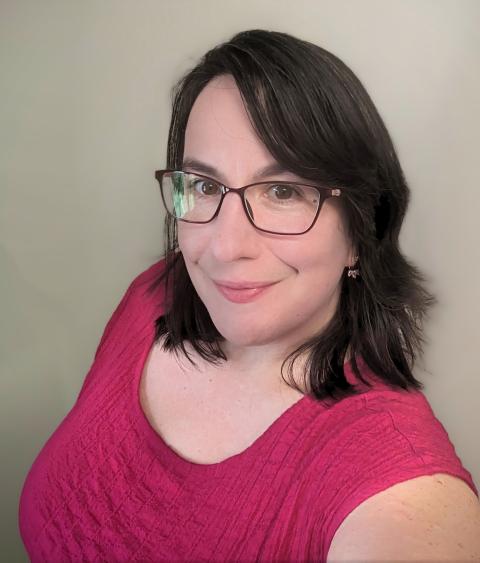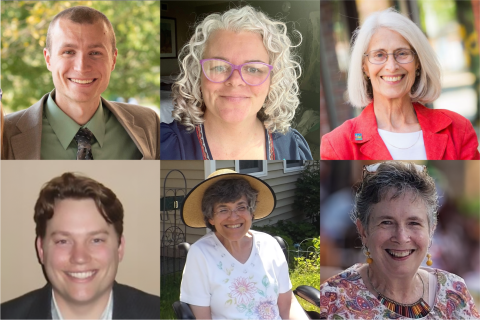NH-ME LEND Spring Kickoff: Organizing to Influence Your State’s Policy
In late January, NH-ME LEND gathered for the annual spring kick-off event: Organizing to Influence Your State’s Policy. An inspiring keynote speaker, Ansley Peacock, and an informative panel discussion set the stage for the upcoming policy module, and the trainees’ participation in the upcoming Disability Policy Seminar (DPS) in Washington, D.C.

Ansley Peacock, keynote speaker for the NH-ME LEND Spring Kickoff event.
Ansley Peacock is the Transition Initiatives Coordinator for New Hampshire Family Voices and Parent Information Center of NH where she facilitates the YEAH Council (Youth for Education, Advocacy, and Healthcare). Additionally, she collaborates with stakeholders through her work with the Youth Healthcare Transition Services Project to improve systems and outcomes for youth through training and outreach. Ansley eloquently described how her personal and professional path to becoming an advocate ignited her passion to engage transition-age youths and young adults. She talked about how her work helps self-advocates bring their ideas to life by fostering a culture of advocacy, supports them to amplify their voices, and encourages them to engage in their youth. She talked about her lifetime of balancing independence versus interdependence, ableism, self-love, and ultimately being her full self.
“I want our youth of today to be able to come to this place far sooner than I did… There are many parts to this process. Part of it is changing systems to be able to meet them more fully. I know system change takes time. Compassion and encouragement do not. Our policies, systems and evaluations may not reflect seeing our youth as their full selves, but we can. Each one of us has the power to shift the culture within our own circles and work.”
Ansley Peacock
Ansley emphasized that policy change can feel daunting. “In addition to talking to our colleagues, legislators, and policymakers, we need to talk to our neighbors, families, and children. This is something we can all do: bring the topic of disability out of the dark and make it more commonplace."
Dr. Alan Cobo-Lewis, Co-Director of the NH-ME LEND Program, served as the panel moderator. “Regardless of whether you understand the specifics of the process, we’ve got a democracy informed by the public on policy,” said Cobo-Lewis. “Each one of us has the opportunity to share our experience and our suggestions for the way to change systems and what the impact of the existing systems are on our life and the people that we love.”
The six panelists, representing a variety of perspectives, discussed organization and mobilization, the influence that people with disabilities and family members have on policy, and the importance of educating legislators. They also reflected on how policy change takes time and that failures and setbacks are to be expected and accepted as part of the journey.

Top row left to right: Connor Archer, Audrey Bartholomew, Peggy Rotundo. Bottom row left to right: Atlee Reilly, Sarah Trites, and Peggy Rotundo.
Panelist Sarah Trites of Maine is a board member for Speaking Up for Us, an organization run by and for adults with developmental disabilities. She has testified before the Maine Legislature several times about bills affecting people with disabilities including the marriage penalty, adult dental benefit, and direct care workers pay. “I’ve been very lucky in my testimony because here in Maine you can testify in many different ways.” Transportation and accessibility were not barriers to Sarah’s participation in the legislative process.
Audrey Bartholomew is the Maine LEND Program’s Training Director and a former special education teacher. She described her first experience attending the Disability Policy Seminar as transformative: “I was blown away by the number of people with disabilities in the audience, on every panel, [participating as] speakers. The DPS was a big turn for me. I saw how much people with disabilities were, at least from that seminar, in the driver’s seat.”
“Each one [of us] is an expert in our own way,” said Connor Archer, a Maine self-advocate and Founder and Chairperson/CEO of the Courageous Steps Project. “Every story looks different; every journey looks different.”
Atlee Reilly is the Legal Director for Disability Rights Maine and collecting stories is part of his job. “People do listen. [They] put down their phones and they stop multi-tasking when there are people who are really impacted and speaking from their own experience; especially if there are multiple people doing that in a way that harmonizes. It allows people to see the impacts of the policy or the lack thereof.”
Senator Peggy Rotundo (D-Androscoggin), serving her fifth non-consecutive term in the Maine Senate and chairs the Appropriations Committee, encouraged advocates to understand and follow the process. “Bills get passed and if there’s any money attached to them, they get sent to the Appropriations Committee,” said Rotundo. “At the end of the legislative session, the Appropriations Committee sees how much money is available for the coming years and makes decisions about which bills are going to get funded.” Last year, the Appropriations Committee had over 2,500 bills to consider.
“We celebrate when we win something big,” said Bonnie Dunham, Associate Director of NH’s Parent Training and Information Center on Special Education. “That lets people who may be shy about participating in that process know that positive outcomes occur.”
Mr. Reilly closed with this thought about persevering in advocacy, “It’s really important if you’re helping people engage in this type of work for their first time, to let them know that failure is not the end of things and that it happens a lot. There’s this whole idea of ‘failing forward’ that is really important.”